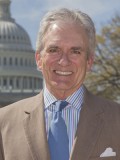 By Executive Director J. Brent Walker
By Executive Director J. Brent Walker
While watching a basketball game on TV on the afternoon of Feb. 13, my iPhone hummed with a Facebook message from one of my friends: “Things just got interesting…” What in the world, I thought? Within seconds, word of the death of Associate Justice Antonin Scalia popped up on my news app.
“Indeed,” I responded.
My friend then wrote back with a bit of black humor about the justice. Social media blew up that afternoon, revealing strong views of Justice Scalia, both pro and con. And, as is typical of today’s world, many were more than scurrilous.
As a lawyer, I must say any jurist who served on the U.S. Supreme Court for nearly three decades is worthy of my respect. Nevertheless, I disagreed with Justice Scalia’s overall jurisprudence, his constitutional hermeneutic, and his understanding of the First Amendment’s Religion Clauses in particular. In addition to having a truncated view of the Establishment Clause — as I wrote about in my January 2016 column — he led the charge in the Native American peyote case, Employment Division v. Smith (1990), which effectively gutted the Free Exercise Clause.
To be sure, Justice Scalia was friendlier to religious liberty when interpreting and applying free exercise-related legislation, such as the Religious Freedom Restoration Act, Religious Land Use and Institutionalized Persons Act, and Title VII of the Civil Rights Act of 1964 with its mandate for religious accommodations. But, as to constitutional interpretation, he emptied both clauses of any meaningful protection as he consistently deferred to the political branches of government.
Yet, Justice Scalia will be remembered as a towering figure on the High Court for his intelligence, wit and sometimes scalding opinions and as the justice who tugged the Court’s center of gravity to the right over the past three decades.
The Republican Senate leadership — notably Majority Leader Mitch McConnell and Judiciary Committee Chair Chuck Grassley — were quick to declare their opposition to holding hearings or otherwise considering anyone the president might nominate to replace Scalia, as they and the president are constitutionally instructed to do. As days went by, their resolve became even more entrenched.
They argued that the nomination of Justice Scalia’s successor should be taken up only after the fall election and the inauguration of a new president. “Let the people decide,” they declared. Well, the people already decided when President Barack Obama was re-elected in 2012. And he was elected for four years, not three years and one month. They point out that Democrats also have been dilatory — pointing to remarks of then-Senate Judiciary Committee Chair Joe Biden opining in 1992 that Senate confirmation would be inappropriate in an election year for Supreme Court nominees. As my mother would say, two wrongs do not make a right. But, in fairness, Biden’s remarks were hypothetical (there was no pending Court vacancy), he was speaking in June (not February), and the president was running for re-election.
The U.S. Supreme Court has an odd number of justices for a reason. The prospect of a 4-4 decision on very important cases — even where it might serve the positions advanced by the Baptist Joint Committee — is unacceptable for any longer than is absolutely necessary. Any delay until after the inauguration in January 2017 would mean a vacancy for more than a year — probably deep into the 2016-2017 term. This is unacceptable. The president should nominate the best qualified, consensus candidate. (Let’s not forget, Justice Scalia, himself, was confirmed 98-0.) The BJC signed a letter with 30 other religious organizations urging Senate leaders to offer “advice and consent,” as provided in the Constitution, on “whomever is nominated.” Sent to Sens. McConnell and Grassley, it said, in part, “Justice delayed is anathema to us as Americans and as people of faith seeking to create a more just nation and world.” The Senate should hold hearings and provide an up or down vote on the nomination.
The likelihood of this happening appears slim. Worse yet, the future of fair, expeditious confirmations might be in jeopardy. When the new president is inaugurated, Justice Ruth Bader Ginsburg will be pushing 84, Justice Kennedy will be 80 and Justice Breyer will be 78. President Obama’s successor may have three nominations that would accomplish a sea change in the High Court even beyond Justice Scalia’s succession.
Beyond urging the president and the Senate leadership to do their constitutional duties, the Baptist Joint Committee will not formally support or oppose the nominee. We could do so under the tax code because the nominees will be appointed to office — not elected. But, for prudential reasons, we have never weighed in to endorse Supreme Court nominees. Nevertheless, we have in the past and shall in the future critique the nominee’s expressed views and record on matters relating to religious liberty and the separation of church and state. We stand ready to provide that educational function.
Justice Antonin Scalia — whether viewed as virtuous or villainous — is gone. The health of our judiciary and the vitality of our democracy require that we move forward to fill that seat. Now!
From the March 2016 edition of Report from the Capital. Click here to view the issue as a PDF document.





